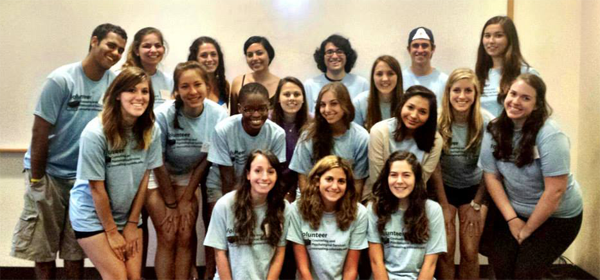Donor-funded peer educator program makes the grade
A year ago Erica Rozbruch (ʼ14) noticed that her friends majoring in business were struggling to cope with stress. She decided to leverage her skills as a peer educator for Counseling and Psychological Services (CAPS) at the University of Colorado Boulder to start a campaign called “How to Be a Happy B-School Student.” She talked with Leeds School of Business students about reducing anxiety, sleeping better and achieving success.
“A business student told me he never felt comfortable walking through the doors of CAPS,” Rozbruch says. “We find people who are not involved in CAPS, go into their community and give them resources.”
Rozbruch is one of CAPS’ four peer educators—student volunteers who commit to an academic-year internship to develop more advanced clinical and outreach skills. They are among 24 student volunteers who provide education about CAPS services for sororities and fraternities, multicultural groups, residence halls and student organizations. The volunteers also pass out care kits with snacks and school supplies to support students during finals at Norlin Library. CAPS Masters and doctoral therapists provide outreach to many campus groups to address academic concerns, diversity on campus, mental health issues and problems with drugs and alcohol.
Each peer educator has a different focus—for example, peer educator Mifa Kim (ʼ14) developed “How to Help a Friend,” an online campaign that gives tips on dealing with eating disorders, stress, drug concerns and adjusting to college life. Since she created it one year ago, 1,400 people have visited the website. All four peer educators facilitate a program called Bounce Back that works with students on academic probation to get back on track.
The Peer Educator program exists thanks to donor support. “The CAPS program is providing a much-needed service to the student body of CU, particularly at the freshman level. There are huge changes that go on with men and women when they arrive at a college campus. They get homesick. The fact there is this outreach, a group of people who care and can help young people through that transition—that’s a great thing,” says television industry executive Howard Schultz (ʼ75), who with his wife, Tana, made gifts to sustain the Peer Educator program.
When Schultz attended CU-Boulder, he worked on a counseling phone hotline to help other students. He also remembers living through a crisis in his dorm room.
“When I was a sophomore, my roommate died of a drug overdose. I think about how long he has been gone and how his life was cut so short. If I can help prevent that from happening by supporting a group of individuals to watch for the signs and take care of students, then I think that is money well spent,” Schultz says.
Reaching thousands of students is truly a combined effort for CAPS staff and volunteers. Program Coordinator Andrea Iglesias has grown the Peer Educator program and made it more diverse—which extends CAPS outreach throughout the campus.
“Peer educators can really speak to the needs of different communities and connect with them in a unique way,” Iglesias says. “With students, it’s more approachable and more accessible for them to reach other students.”
Over the past five years, there has been a 37 percent increase in individual sessions and a 78 percent increase in group appointments. As more students request services, CAPS looks to donors to also expand the Peer Educator program.
After serving as a peer educator for three years and also as president of CU’s Senior Class Council, Rozbruch will graduate this May to pursue a PhD in clinical psychology. Having struggled through a freshman biology class, she understands what students in the Bounce Back program are going through.
“I’m here because I’ve done better in school and I know these students can too,” Rozbruch says. “If they keep trying they can become successful. Donors are helping to give these students a second chance.”


